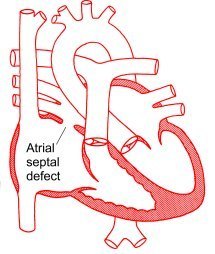Healthy hearts have a wall that separates the right and left sides. An atrial septal defect occurs when there is a hole in this wall. This hole can cause problems with blood flow through the heart and body. ASD is not that common: only 0.6% of all babies are born with a hole in their heart wall. However, the consequences of this defect can be deadly.

Symptoms
ASD can cause newborns to have trouble breathing. This, in turn, leads to other issues like malnourishment, irreversible lung circulation damage, other complications and eventually death. It is very important to recognize this pathology and treat it before it is too late.
Treatments
There are several different ways to treat ASD.
- Surgical Therapy. When the atrial septal defect is small, it can sometimes close on its own. However, if the hole is large, it can cause severe symptoms. Minimally invasive atrial septal defect repairs can be performed to restore the normal anatomy for good. The surgery involves a tiny 2″ incision on the chest wall. Dr. Ciuffo will close the ASD with a suture line or a patch of the patient’s own tissue. Minimally invasive patients can benefit from having a very small scar, significantly less pain, and a quick recovery compared to other methods.
- Medical Therapy. For newborns with a small atrial septal defect with no symptoms, a pediatric cardiologist will most likely observe the patient and wait for the atrial septal defect to close on its own. If this does occur, the baby will have regular physical examinations and echocardiograms.
- Catheter Therapy. In some cases, the ASD can be closed with a catheter. A thin, long catheter is inserted through the groin and positioned in the heart across the ASD. The catheter will then deploy and anchor a special mechanical patch, known as the “clamshell” device. The device will effectively close the hole using two wire and silicone disks.
Minimally Invasive Atrial Septal Defect (ASD) Repair
If you, your baby, or someone you know is suffering from an atrial septal defect and aren’t sure which route to take, feel free to contact us for more information. Dr. Ciuffo will be able to discuss your options and an open and friendly environment. Call our office at (330) 363-1341 or contact us online.

